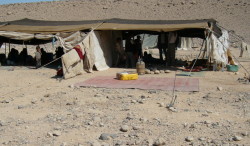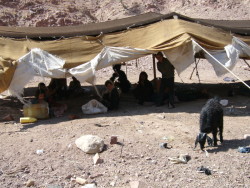 Photo.
Photo. A Bedouin tent with the caracteristic black
roof.
The Bedouins are one of the best known groups from Jordan's population. It`s
generally known that the majority of Jordan's population is of Bedouin origin.
As they are known in Arabic, the Bedu, or "desert dwellers," they have adapted
to live in a harsh souroundings and extreme.
Bedouins are often stereotyped as constantly wandering the desert in search
of water and food for their flocks. This is only partly true. Only a small
portion of Bedouin can still be regarded as true nomads, while many have settled
down to cultivate crops rather than drive their animals across the desert.
|
Photo. Another Bedouin tent.
The only place where I found shadow and could cool down little bit.
|
 |
Most Bedouin have combined the two lifestyles to some degree. Those Bedouins
who still practice pastoralism will camp in one spot for a few months at a time,
grazing their herds of goats, sheep or camels until the fodder found in the
area is exhausted. It is then time to move on.
Often the only concession they make to the modern world is the acquisition of
a pick-up truck (to move their animals long distances), plastic water containers
and perhaps a kerosene stove.
More information will follow based on my journey in Jordan in
July 2005.
Stein Morten Lund, 5 September
2005





 Photo. A Bedouin tent with the caracteristic black
roof.
Photo. A Bedouin tent with the caracteristic black
roof.







